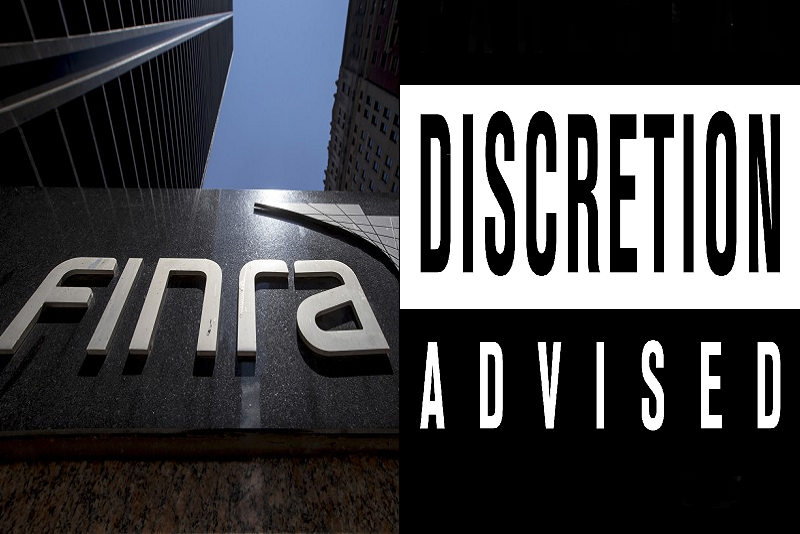BROWSE BY TOPIC
- Bad Brokers
- Compliance Concepts
- Investor Protection
- Investments - Unsuitable
- Investments - Strategies
- Investments - Private
- Features/Scandals
- Companies
- Technology/Internet
- Rules & Regulations
- Crimes
- Investments
- Bad Advisors
- Boiler Rooms
- Hirings/Transitions
- Terminations/Cost Cutting
- Regulators
- Wall Street News
- General News
- Donald Trump & Co.
- Lawsuits/Arbitrations
- Regulatory Sanctions
- Big Banks
- People
TRENDING TAGS
Stories of Interest
- Sarah ten Siethoff is New Associate Director of SEC Investment Management Rulemaking Office
- Catherine Keating Appointed CEO of BNY Mellon Wealth Management
- Credit Suisse to Pay $47Mn to Resolve DOJ Asia Probe
- SEC Chair Clayton Goes 'Hat in Hand' Before Congress on 2019 Budget Request
- SEC's Opening Remarks to the Elder Justice Coordinating Council
- Massachusetts Jury Convicts CA Attorney of Securities Fraud
- Deutsche Bank Says 3 Senior Investment Bankers to Leave Firm
- World’s Biggest Hedge Fund Reportedly ‘Bearish On Financial Assets’
- SEC Fines Constant Contact, Popular Email Marketer, for Overstating Subscriber Numbers
- SocGen Agrees to Pay $1.3 Billion to End Libya, Libor Probes
- Cryptocurrency Exchange Bitfinex Briefly Halts Trading After Cyber Attack
- SEC Names Valerie Szczepanik Senior Advisor for Digital Assets and Innovation
- SEC Modernizes Delivery of Fund Reports, Seeks Public Feedback on Improving Fund Disclosure
- NYSE Says SEC Plan to Limit Exchange Rebates Would Hurt Investors
- Deutsche Bank faces another challenge with Fed stress test
- Former JPMorgan Broker Files racial discrimination suit against company
- $3.3Mn Winning Bid for Lunch with Warren Buffett
- Julie Erhardt is SEC's New Acting Chief Risk Officer
- Chyhe Becker is SEC's New Acting Chief Economist, Acting Director of Economic and Risk Analysis Division
- Getting a Handle on Virtual Currencies - FINRA
ABOUT FINANCIALISH
We seek to provide information, insights and direction that may enable the Financial Community to effectively and efficiently operate in a regulatory risk-free environment by curating content from all over the web.
Stay Informed with the latest fanancialish news.
SUBSCRIBE FOR
NEWSLETTERS & ALERTS
Abuse of Authority (FINRA Exam Findings – 5th and Concluding Part)
by Howard Haykin
With this ominous sounding title, FINRA tackles discretionary and fiduciary authorizations that customers bestow on their registered reps, which can involve: (i) trading; (ii) acting as trustees or co-trustees; (iii) holding Powers of Attorney; and, (iv) serving as executors or beneficiaries.
Without appropriate controls in place, investors can be exposed to material risks, such as unsuitable or excessive trading. That's where NASD Rule 2510 (Discretionary Accounts) comes in, establishing such controls that … (i) require firms to accept discretionary accounts only in writing; (ii) prohibit firms from effecting transactions that are excessive in size or frequency relative to the financial resources and character of the account; and, (iii) require firms to approve discretionary orders in writing and review discretionary accounts at frequent intervals.
FINRA 2018 FINDINGS – WHAT DIDN’T WORK. In some situations, firms or their registered reps ("RRs") exposed investors to unnecessary risks, and firms had not established controls to mitigate those risks.
- No Authorization – Some RRs exercised discretion in customer accounts without the customers’ prior written authorization (though sometimes with verbal authorization) or the firm’s approval of the discretionary account. Others executed transactions in customer accounts as an accommodation without receiving specific customer authorization to execute that transaction.
- Expired Authorizations – Some RRs exercised discretion after the authority to do so had expired - e.g., authorizations to exercise time or price discretion, which typically terminate at the end of the business day on which they are granted.
- Mismarking Order Tickets – Some RRs mismarked order tickets as “unsolicited” to obscure unauthorized discretionary trading when, in fact, customers had not initiated the transactions and were unaware of the trading occurring in their accounts. Other RRs mismarked order tickets and placed trades in customer accounts that did not comply with the securities’ threshold limitations or trading restrictions.
- False Statements and Blank Forms –Some RRs made false statements on the firm’s compliance questionnaires and attestations regarding discretionary authorization, or had customers sign blank suitability or new account forms.
- Abuse of Trustee Status – Some RRs convinced senior investors to establish trusts and name the RRs as trustees or co-trustees in order to take control of the trust assets and direct funds to themselves. Similar concerns involve RRs who maintain other significant roles in customer accounts, such as Power of Attorney (POA), executor or beneficiary.





